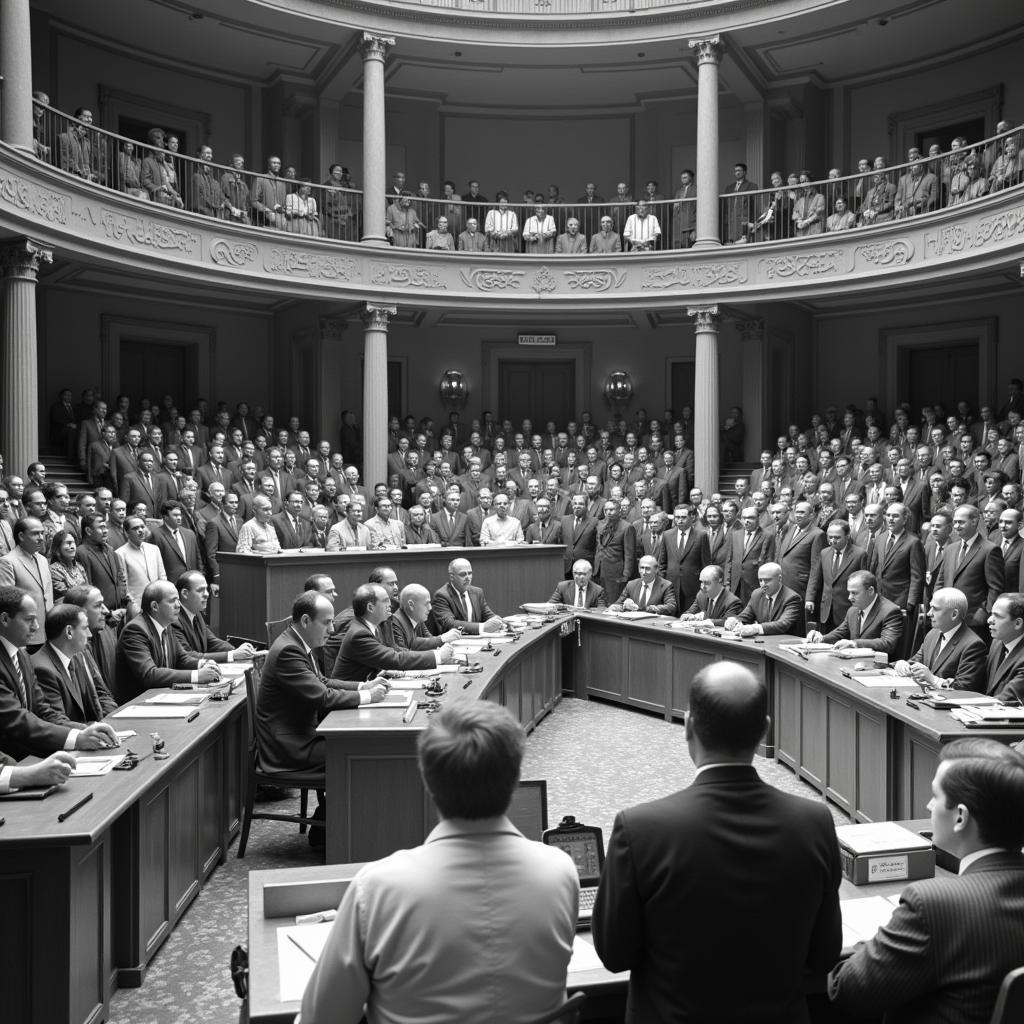Constitutional Development In Pakistan From 1947 To 1956 was a tumultuous period marked by political instability and the struggle to establish a workable framework for the newly formed nation. This period witnessed numerous attempts to draft a constitution that reflected the aspirations and addressed the diverse needs of the Pakistani people. The process was fraught with challenges, including the integration of various provinces, the debate over the role of Islam, and the power struggle between different political factions.
The Initial Phase: The Objective Resolution and the Basic Principles Committee
Immediately after independence in 1947, Pakistan inherited the Government of India Act 1935, which served as an interim constitution. However, the need for a constitution specifically tailored to Pakistan’s unique circumstances was evident. In March 1949, the Constituent Assembly passed the Objectives Resolution, which laid down the basic principles for the future constitution. This resolution, introduced by Liaquat Ali Khan, declared Pakistan an Islamic state and emphasized the sovereignty of God. It aimed to guarantee fundamental rights and freedoms to all citizens, regardless of their religion, race, or caste. The resolution also envisioned provincial autonomy within a federal structure.
The Objectives Resolution set the stage for the formation of the Basic Principles Committee (BPC), which was tasked with drafting the constitution based on the resolution’s principles. The BPC, however, faced several obstacles, including disagreements over the distribution of power between the center and provinces and the exact role of Islam in the state. This period saw heated debates and political maneuvering, delaying the process of constitution-making.
 Objective Resolution of 1949
Objective Resolution of 1949
Challenges and Delays: Political Instability and Provincial Disputes
The early years of Pakistan were characterized by political instability, further complicating the constitutional process. The assassination of Liaquat Ali Khan in 1951 created a leadership vacuum. Subsequent governments struggled to maintain stability, and the frequent change in leadership hindered the progress of constitution-making. Moreover, disputes arose between the provinces, particularly regarding the distribution of resources and representation in the federal legislature. The issue of One Unit, which merged West Pakistan’s provinces into a single administrative unit in 1955, also added to the complexity of the constitutional debate. This move, aimed at balancing the representation of East and West Pakistan, was met with resistance from some quarters, who saw it as a way to marginalize smaller provinces.
constitutional history of pakistan
The 1956 Constitution: A Milestone Achieved
Despite the numerous hurdles, Pakistan finally adopted its first constitution on March 23, 1956. This constitution declared Pakistan an Islamic Republic, with the official name being “The Islamic Republic of Pakistan.” It established a parliamentary system of government, with a unicameral legislature known as the National Assembly. The constitution guaranteed fundamental rights to citizens and provided for provincial autonomy. It also introduced the concept of parity between East and West Pakistan in the National Assembly, aiming to address the concerns of both wings of the country.
The 1956 Constitution, while a significant milestone, was short-lived. Political instability continued to plague the nation, and the constitution was abrogated in 1958 following a military coup. However, it laid the groundwork for future constitutional developments and provided valuable lessons for the subsequent constitution-making processes in Pakistan.
What were the key features of the 1956 Constitution?
The 1956 Constitution established a parliamentary system, declared Pakistan an Islamic Republic, and provided for fundamental rights and provincial autonomy.
constitutional and political development of pakistan pdf
Why was the 1956 Constitution abrogated?
The 1956 Constitution was abrogated in 1958 due to ongoing political instability and a subsequent military coup.
How did the Objectives Resolution influence the 1956 Constitution?
The Objectives Resolution served as the foundation for the 1956 Constitution, outlining the basic principles, including the Islamic nature of the state and fundamental rights.
Conclusion
The constitutional development in Pakistan from 1947 to 1956 represents a crucial period in the nation’s history. While the 1956 Constitution was eventually abrogated, its creation signified a significant step toward establishing a democratic framework. The challenges faced during this era highlighted the complexities of nation-building and the ongoing struggle to balance diverse interests and aspirations within a unified constitutional framework. The period from 1947 to 1956 ultimately shaped the future of constitutional development in Pakistan.
FAQs
- What was the first constitution of Pakistan? The first constitution of Pakistan was adopted in 1956.
- When was the Objective Resolution passed? The Objective Resolution was passed in March 1949.
- What was the One Unit policy? The One Unit policy merged the provinces of West Pakistan into a single administrative unit in 1955.
- Why was the constitution-making process delayed? The constitution-making process was delayed due to political instability, provincial disputes, and disagreements over the role of Islam.
- What type of government did the 1956 Constitution establish? The 1956 Constitution established a parliamentary system of government.
- When was the 1956 Constitution abrogated? The 1956 Constitution was abrogated in 1958.
- What is the significance of the Objectives Resolution in Pakistan’s constitutional history? The Objectives Resolution laid the foundation for the basic principles of Pakistan’s future constitutions.
Further Exploration
For more information on related topics, you can explore these additional resources on our website:
- The Political History of Pakistan
- The Role of Islam in Pakistani Politics
- Federalism in Pakistan
Contact Us
For any assistance or further inquiries, please don’t hesitate to contact us:
Phone: +923337849799
Email: [email protected]
Address: Dera Ghazi Khan Rd, Rakhni, Barkhan, Balochistan, Pakistan.
Our customer service team is available 24/7 to assist you.